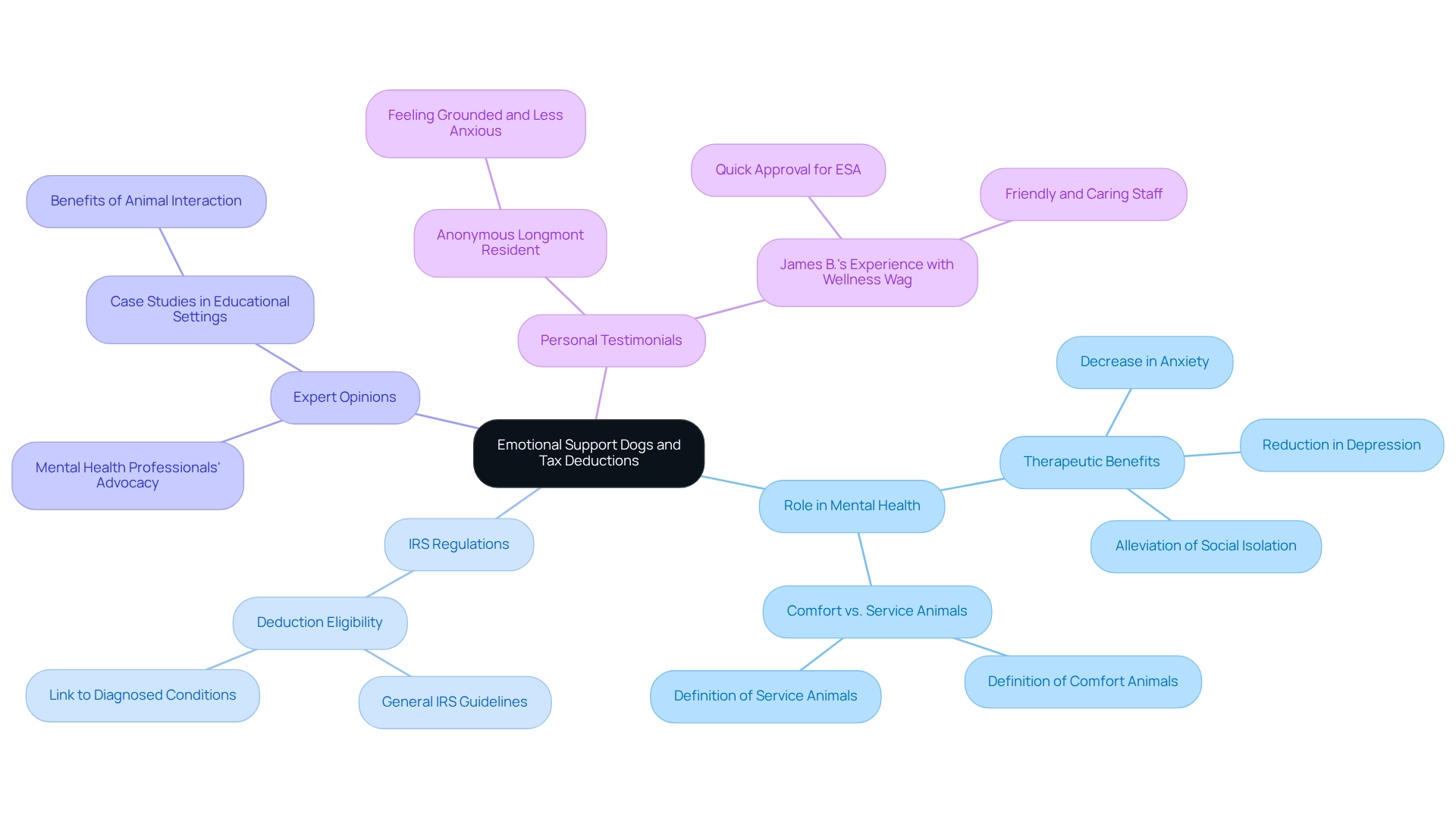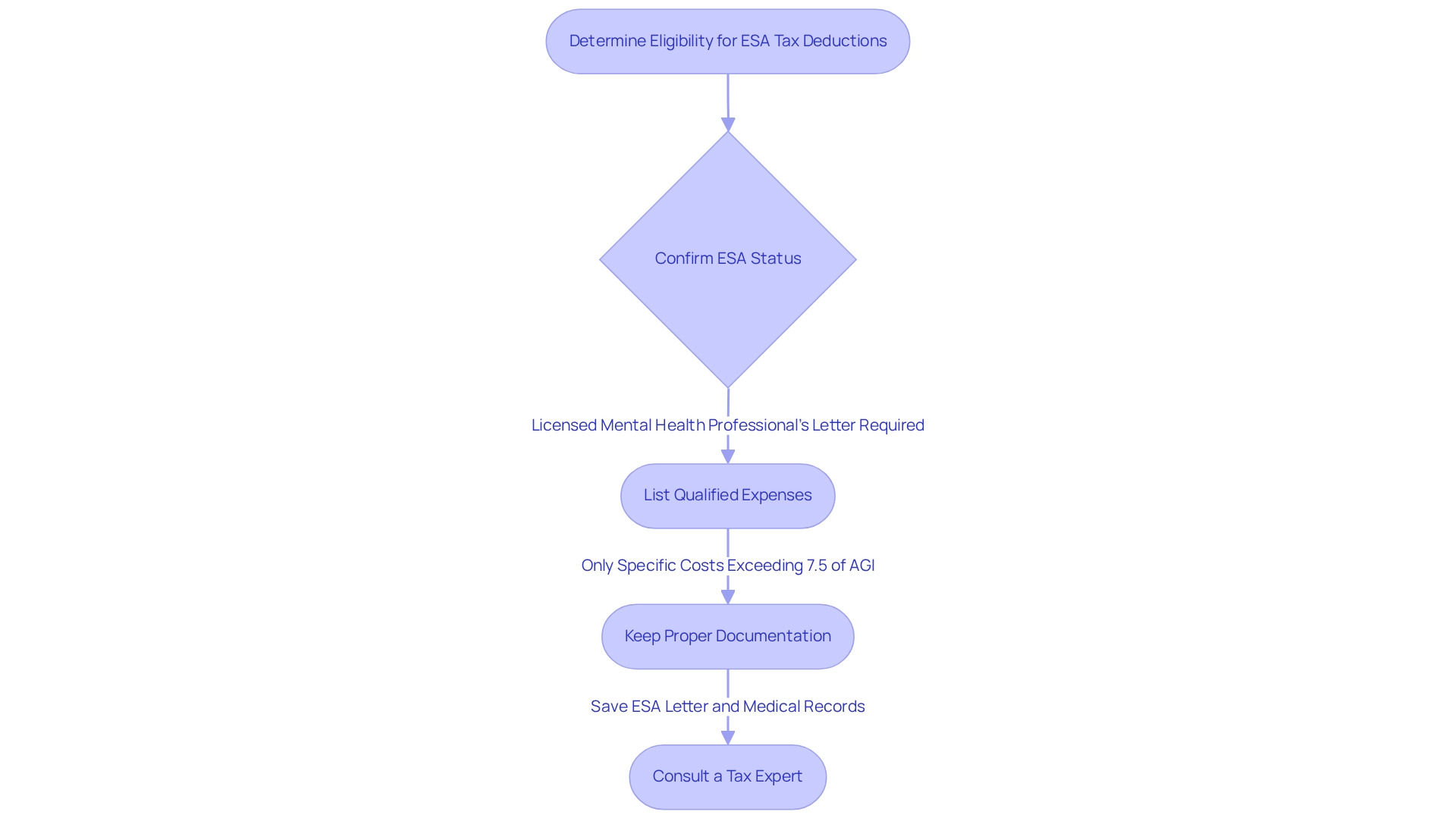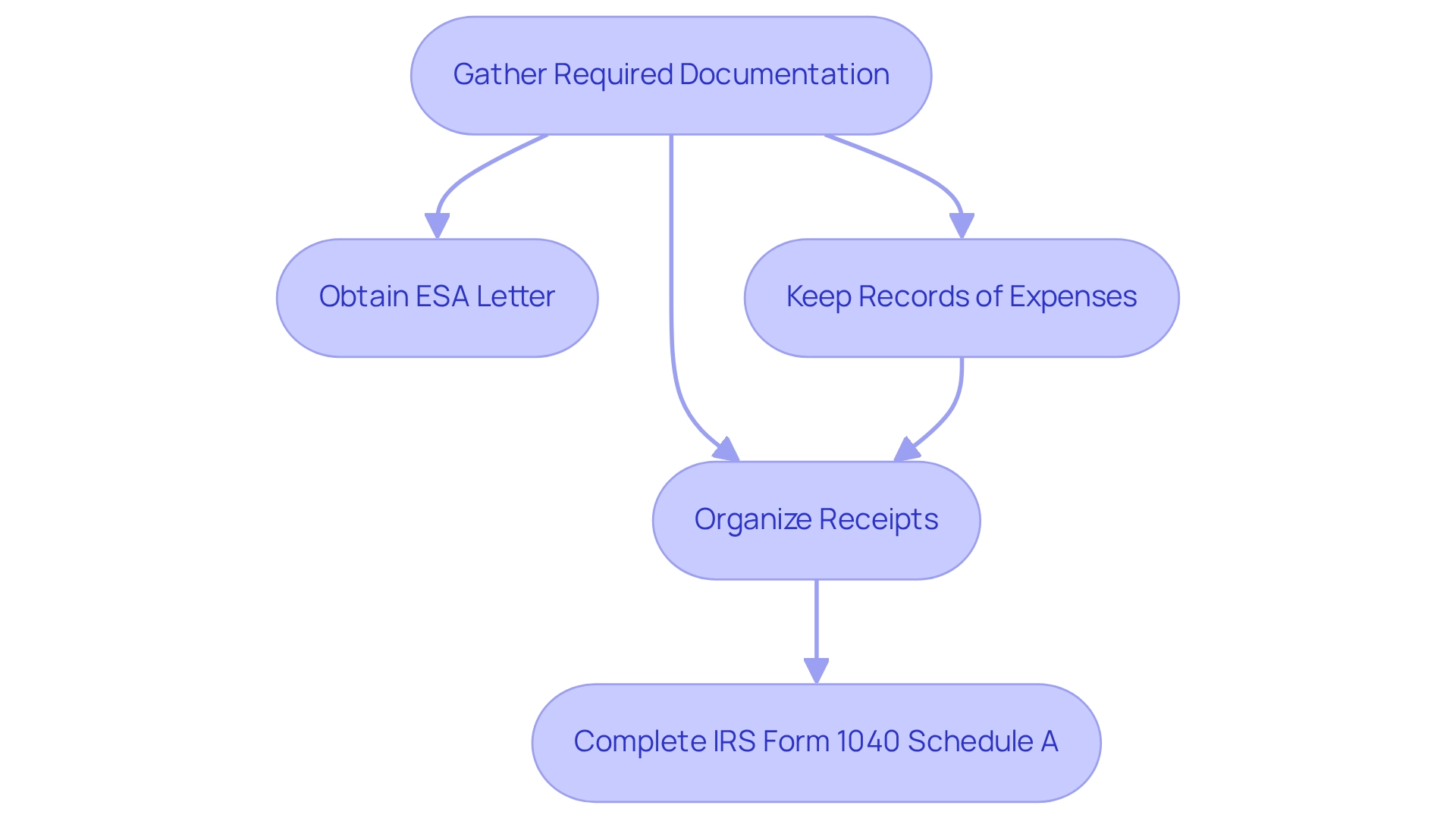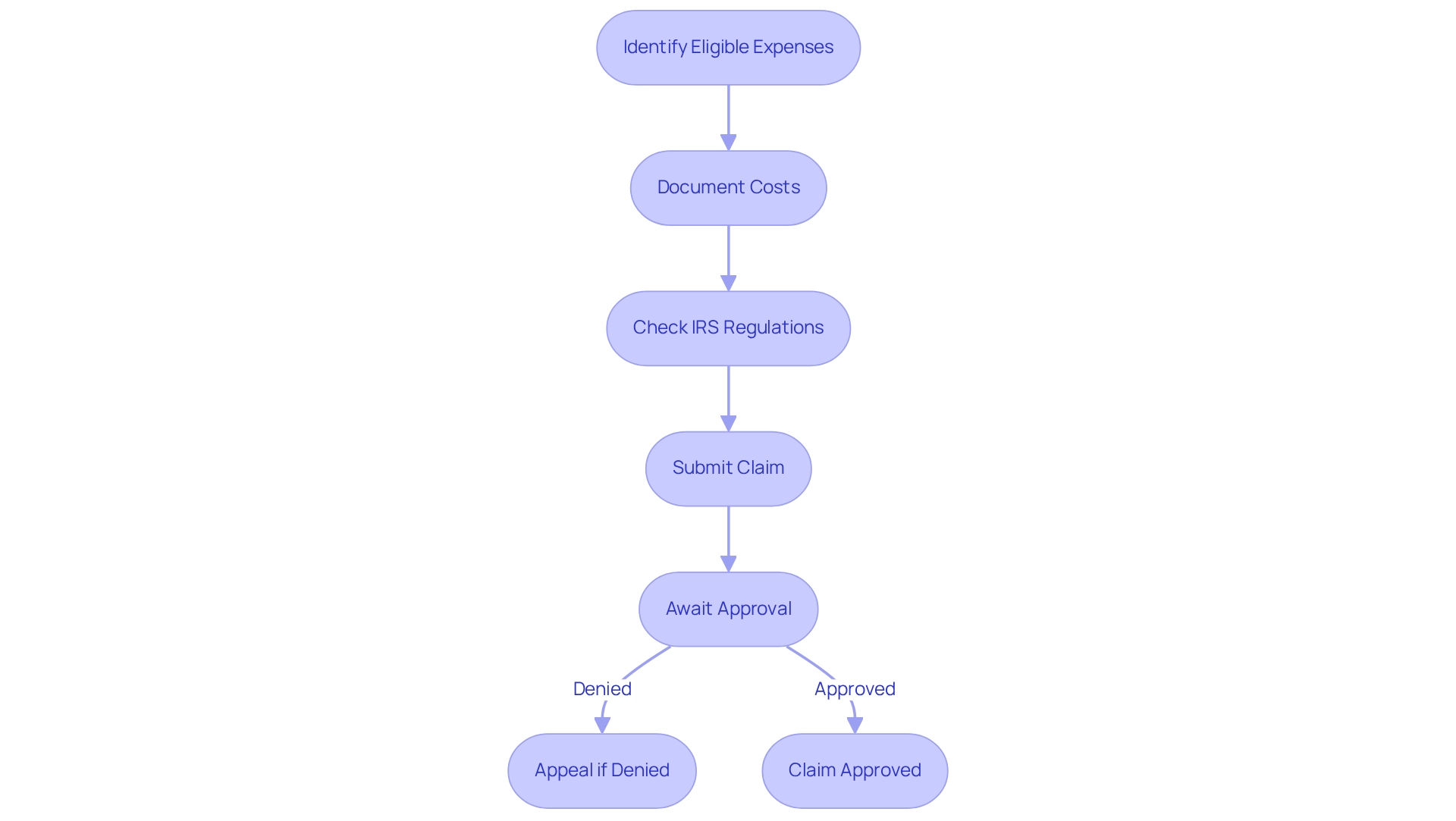

4 Steps to Claim My Emotional Support Dog on My Taxes
by Lena Park
Last updated: July 6, 2025
Verified and Approved by:
Angela Morris,
MSW, LCSW
Fact Checked

Overview
Navigating the complexities of tax deductions can be particularly challenging for those grappling with mental health issues. Claiming an emotional support dog on your taxes is generally not permissible under IRS guidelines, as only expenses directly linked to diagnosed medical conditions may qualify for deductions. This can feel disheartening, especially when the emotional support provided by these beloved companions is invaluable.
To strengthen your claims, it’s crucial to maintain thorough documentation, such as a letter from a licensed mental health professional. This supportive measure can help validate your needs and the role your ESA plays in your well-being. Additionally, it’s important to remember that only specific medical-related expenses exceeding 7.5% of adjusted gross income are eligible for deduction.
This reinforces the complexity of navigating this process, but you are not alone. There are resources and support systems available to help you through this journey, ensuring that you can focus on your mental health and the comfort your emotional support animal provides.
Introduction
In a world where mental health awareness is blossoming, emotional support dogs have become essential companions for those navigating psychological challenges. These animals offer not just comfort but also a profound sense of companionship, making a significant difference in the lives of their owners.
However, the financial aspects of caring for these beloved pets can often lead to confusion, particularly when it comes to tax deductions. For pet owners, understanding the complexities of IRS guidelines can feel overwhelming, especially when trying to claim expenses related to their emotional support animals.
This article aims to shed light on the eligibility criteria, necessary documentation, and common hurdles faced when claiming deductions for emotional support dogs, providing insights that empower individuals to make informed choices about their mental health and financial well-being.
Understand the Role of Emotional Support Dogs in Tax Deductions
Emotional assistance dogs play a vital role in providing comfort and companionship to individuals facing mental health challenges. Unlike assistance animals, which are trained to perform specific tasks, comfort companions primarily offer emotional support. Although the IRS generally does not recognize comfort animals as eligible for tax deductions, understanding their significance in your treatment plan can help you determine if you can claim my emotional support dog on my taxes related to medical expenses.
While therapy animals can significantly enhance mental well-being, their associated costs are often categorized differently than those of service animals. The IRS regulations indicate that expenses for therapy animals may not be deductible unless they are directly linked to a diagnosed mental health condition. This distinction is crucial for individuals trying to determine if any related expenses might qualify for deductions under current tax laws.
Recent data highlight the positive impact of therapy animals on mental health. For instance, veterans with PTSD have reported significant reductions in depression, anxiety, and social isolation after being paired with service dogs. This underscores the therapeutic benefits that companionship animals can provide, even if they do not meet the stringent criteria for tax deductions.
Expert opinions further reinforce the importance of therapy animals in mental health care. Mental health professionals often advocate for the inclusion of comfort animals in therapeutic settings, recognizing their ability to alleviate symptoms of anxiety and depression. Moreover, case studies from various educational institutions reveal that the presence of therapy animals contributes to reduced stress levels among students, enhancing overall mental well-being.
A nameless Longmont resident shared, “She’s helped me feel more stable and less anxious,” illustrating the profound emotional support that these animals can offer. Similarly, James B. expressed, “Thanks to Wellness Wag, I received approval for my ESA quickly and without any difficulties. Their staff is friendly and caring,” highlighting the exceptional service and streamlined online process provided by Wellness Wag.
In conclusion, while therapy dogs may not qualify for tax deductions under IRS guidelines, it raises the question of can I claim my emotional support dog on my taxes, considering their undeniable role in enhancing mental health? Individuals are encouraged to seek guidance from certified professionals for assistance in integrating therapeutic pets into their lives and understanding the potential financial implications. Wellness Wag is dedicated to customer satisfaction and has built trust in the community, making it a reliable resource for obtaining ESA letters efficiently.

Determine Eligibility Criteria for Tax Deductions
Requesting reimbursements for your emotional support dog can feel daunting, but it’s important to recognize that your animal is a documented emotional support animal (ESA), and you might wonder, can I claim my emotional support dog on my taxes, as it plays a crucial role in your mental health treatment. Many individuals face emotional challenges, and ESAs provide comfort, alleviating symptoms related to mental health conditions. This support is especially vital for students with disabilities.
To navigate the reimbursement process, the IRS requires proof of medical necessity, typically in the form of a letter from a licensed mental health professional, which raises the question, can I claim my emotional support dog on my taxes? This letter confirms that your ESA is integral to your treatment plan.
As you prepare to list your deductions on your tax return, consider if you can claim my emotional support dog on my taxes, as the standard deduction does not cover costs related to pets. To determine if I can claim my emotional support dog on my taxes, it’s important to note that only specific expenses qualify for deductions, and they must exceed 7.5% of your adjusted gross income to be eligible.
It’s essential to keep proper documentation, including your ESA letter and any related medical records, to support your claims, particularly when considering if I can claim my emotional support dog on my taxes. Be aware that accuracy-related penalties for underpaid tax can reach 20% of the owed amount, underscoring the importance of meticulous record-keeping, especially when considering if I can claim my emotional support dog on my taxes.
To avoid these risks, consider consulting a tax expert before attempting to deduct ESA-related costs. Understanding the role of ESAs not only assists in managing tax deductions but also highlights their significance in enhancing mental wellness and housing access for those in need. Remember, you are not alone in this journey; support is available to help you navigate these challenges.

Gather Required Documentation and Complete the Claim Process
To determine if I can claim my emotional support dog on my taxes, it is essential to gather specific documentation related to the costs associated with your support dog. Start by obtaining a valid ESA letter from a licensed mental health expert, which serves as proof of your pet’s importance for your emotional well-being. This letter is vital for supporting your claim.
Next, keep careful records of all expenses related to your ESA, such as veterinary bills, food, grooming, and supplies. Many individuals may not realize how significantly these costs can impact both their lives and their pet’s well-being, making accurate record-keeping crucial. Studies reveal that:
- 47% of pet parents have faced pet-related debt
- 42% struggle to cover unexpected vet bills, with emergency vet costs averaging between $800 and $1500
This underscores the importance of understanding the financial challenges of pet ownership, alongside the companionship these animals provide. These records will be invaluable when itemizing your deductions on IRS Form 1040 Schedule A.
Organizing your documentation is key. Ensure that all receipts and records are systematically arranged and easily accessible for your tax preparer or for your own reference if you are filing independently. This preparation can simplify the process and improve the chances of a successful claim.
Case studies show that individuals who have successfully claimed ESA-related expenses often emphasize the significance of thorough documentation. For instance, a research project titled ‘Correlation Between ESA Ownership and Mental Health Improvement’ found a strong connection between ESA ownership and improvements in mental health, highlighting the essential role these animals play in providing psychological support. Furthermore, Jonalyn Dionio remarked, ‘The data shows a growing reliance on ESAs and service dogs, underscoring their vital role in mental health care and public well-being.’ Tax consultants also recommend itemizing deductions for therapy animals and stress the importance of clear documentation to determine if I can claim my emotional support dog on my taxes. By following these steps and gathering the necessary documentation, you can navigate the claim process with confidence and ensure that you receive the benefits associated with your therapy dog.

Navigate Common Challenges and Ensure Compliance
Requesting deductions for therapy dogs raises the question, can I claim my emotional support dog on my taxes, which can be a daunting process, especially given the strict regulations set by the IRS. Many individuals mistakenly believe that all pet-related costs are deductible; however, it is essential to understand that only those expenses deemed medically necessary can be claimed. This complexity can feel overwhelming, but ensuring that your emotional support animal (ESA) is properly documented is a crucial step. Maintaining detailed records of all associated costs is vital, particularly in the event of an audit, as it can provide you with the reassurance you need during this challenging journey.
Statistics reveal that the IRS frequently conducts audits concerning pet cost claims, underscoring the importance of thorough documentation. If your claim faces denial, remember that you have the right to appeal; however, having comprehensive records will significantly strengthen your case. Seeking the advice of a tax professional who understands the nuances of ESA-related deductions can offer invaluable support, guiding you through the specific IRS guidelines that apply to your situation.
Common hurdles in obtaining tax deductions for emotional support animals arise when individuals ask, ‘can I claim my emotional support dog on my taxes,’ as they must demonstrate the medical necessity of the costs and adhere to IRS regulations. For instance, expenses that are not clearly linked to a qualifying purpose, as outlined by IRS guidelines, should be approached with caution. As financial specialists often advise, it is safer to refrain from deducting costs that lack a clear connection to qualifying purposes. Additionally, business-related pet expenses may be reported under Schedule C for business profits or losses, providing further avenues for deductions.
Wellness Wag has introduced pet insurance options that can assist pet owners in managing the financial aspects of caring for a companion animal. Their flexible payment plans start at just $32.25, making it more accessible for working professionals to obtain essential documentation and assistance for their ESAs. As one satisfied client, James B., shared, “Thanks to Wellness Wag, I received approval for my ESA quickly and without any difficulties. Their staff is friendly and caring.” This testimonial highlights how Wellness Wag’s streamlined services not only facilitate quick approvals but also help clients navigate the complexities of ESA documentation, ultimately alleviating the burden of claiming deductions. By staying informed and organized, you can successfully navigate the intricacies of how you can claim your emotional support dog on your taxes, feeling supported every step of the way.

Conclusion
Emotional support dogs play a vital role in enhancing the well-being of individuals facing mental health challenges. While it can be disheartening to learn that the IRS does not typically recognize these animals for tax deductions, understanding the specific eligibility criteria and necessary documentation is crucial for pet owners. Establishing that an emotional support dog is integral to a treatment plan is the first step in navigating potential deductions related to medical expenses.
Gathering proper documentation, including a valid ESA letter from a licensed mental health professional, is essential for substantiating claims. Meticulous record-keeping of all expenses associated with the emotional support dog will not only aid in itemizing deductions but also protect against potential audits. By understanding the financial implications and challenges of claiming these deductions, individuals can prepare themselves for a smoother process.
Ultimately, while claiming deductions for emotional support dogs may present hurdles, the importance of these animals in promoting mental health cannot be overstated. They provide invaluable companionship and support, making a significant difference in the lives of their owners. Staying informed, organized, and consulting with professionals can empower individuals to navigate the complexities of tax deductions while also recognizing the profound emotional benefits that their furry companions provide. Remember, you are not alone in this journey; support is available to help you every step of the way.
Frequently Asked Questions
What is the role of emotional assistance dogs?
Emotional assistance dogs provide comfort and companionship to individuals facing mental health challenges, primarily offering emotional support rather than performing specific tasks.
Can I claim my emotional support dog on my taxes?
The IRS generally does not recognize comfort animals as eligible for tax deductions. However, understanding their significance in your treatment plan may help you determine if any related expenses qualify for deductions under current tax laws.
How are therapy animals different from service animals in terms of tax deductions?
Therapy animals’ associated costs are often categorized differently than those of service animals. The IRS indicates that expenses for therapy animals may not be deductible unless they are directly linked to a diagnosed mental health condition.
What evidence supports the benefits of therapy animals on mental health?
Recent data show that veterans with PTSD have reported significant reductions in depression, anxiety, and social isolation after being paired with service dogs, highlighting the therapeutic benefits of companionship animals.
What do mental health professionals say about therapy animals?
Mental health professionals advocate for the inclusion of comfort animals in therapeutic settings, recognizing their ability to alleviate symptoms of anxiety and depression.
Are there any personal stories that illustrate the impact of emotional support dogs?
A Longmont resident shared that her emotional support dog helped her feel more stable and less anxious. Another individual, James B., praised Wellness Wag for their efficient service in obtaining an ESA letter.
What should individuals consider when integrating therapeutic pets into their lives?
Individuals are encouraged to seek guidance from certified professionals to understand the potential financial implications and the role of therapeutic pets in their mental health care.
Certify Your Emotional Support Animal Today

Why You Can Rely on Us?
At Wellness Wag, we believe your pet deserves care rooted in both science and compassion. Each article is carefully researched, written in clear language for pet owners, and then reviewed by qualified professionals to ensure the information is evidence-based, current, and practical for real-life care. Our goal is to help you feel confident in making informed decisions about your pet’s health and well-being.
Reviewed by
Angela Morris, MSW, LCSW
Angela is a licensed clinical social worker with 20 years of experience in patient advocacy and community mental health. She has assisted numerous clients with ESA evaluations and brings a deep understanding of disability accommodations, ensuring that all information is accurate, supportive, and practical.

Written by :
Lena Park
Last Updated :
July 6, 2025












